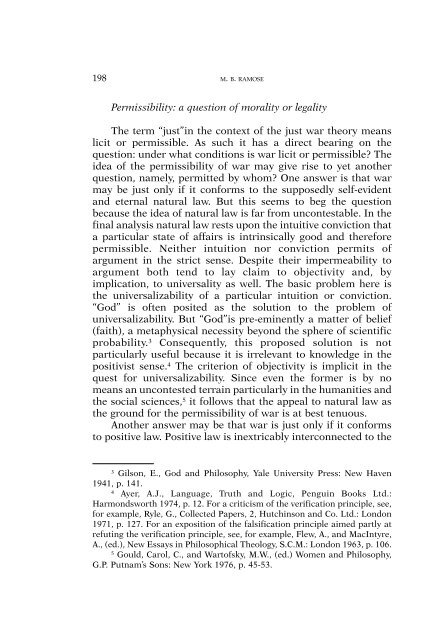Vol. XXXVIII / 1 - Studia Moralia
Vol. XXXVIII / 1 - Studia Moralia
Vol. XXXVIII / 1 - Studia Moralia
Create successful ePaper yourself
Turn your PDF publications into a flip-book with our unique Google optimized e-Paper software.
198 M. B. RAMOSE<br />
Permissibility: a question of morality or legality<br />
The term “just”in the context of the just war theory means<br />
licit or permissible. As such it has a direct bearing on the<br />
question: under what conditions is war licit or permissible? The<br />
idea of the permissibility of war may give rise to yet another<br />
question, namely, permitted by whom? One answer is that war<br />
may be just only if it conforms to the supposedly self-evident<br />
and eternal natural law. But this seems to beg the question<br />
because the idea of natural law is far from uncontestable. In the<br />
final analysis natural law rests upon the intuitive conviction that<br />
a particular state of affairs is intrinsically good and therefore<br />
permissible. Neither intuition nor conviction permits of<br />
argument in the strict sense. Despite their impermeability to<br />
argument both tend to lay claim to objectivity and, by<br />
implication, to universality as well. The basic problem here is<br />
the universalizability of a particular intuition or conviction.<br />
“God” is often posited as the solution to the problem of<br />
universalizability. But “God”is pre-eminently a matter of belief<br />
(faith), a metaphysical necessity beyond the sphere of scientific<br />
probability. 3 Consequently, this proposed solution is not<br />
particularly useful because it is irrelevant to knowledge in the<br />
positivist sense. 4 The criterion of objectivity is implicit in the<br />
quest for universalizability. Since even the former is by no<br />
means an uncontested terrain particularly in the humanities and<br />
the social sciences, 5 it follows that the appeal to natural law as<br />
the ground for the permissibility of war is at best tenuous.<br />
Another answer may be that war is just only if it conforms<br />
to positive law. Positive law is inextricably interconnected to the<br />
3<br />
Gilson, E., God and Philosophy, Yale University Press: New Haven<br />
1941, p. 141.<br />
4<br />
Ayer, A.J., Language, Truth and Logic, Penguin Books Ltd.:<br />
Harmondsworth 1974, p. 12. For a criticism of the verification principle, see,<br />
for example, Ryle, G., Collected Papers, 2, Hutchinson and Co. Ltd.: London<br />
1971, p. 127. For an exposition of the falsification principle aimed partly at<br />
refuting the verification principle, see, for example, Flew, A., and MacIntyre,<br />
A., (ed.), New Essays in Philosophical Theology, S.C.M.: London 1963, p. 106.<br />
5<br />
Gould, Carol, C., and Wartofsky, M.W., (ed.) Women and Philosophy,<br />
G.P. Putnam’s Sons: New York 1976, p. 45-53.
















